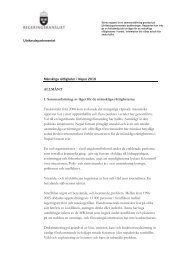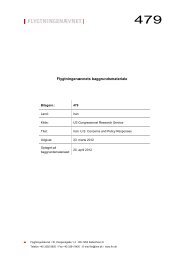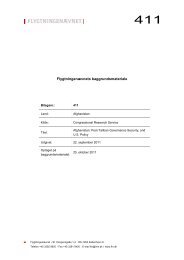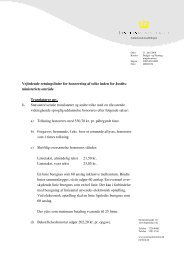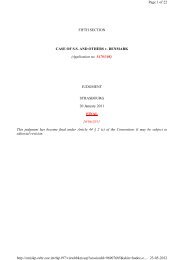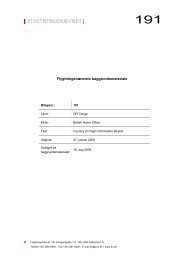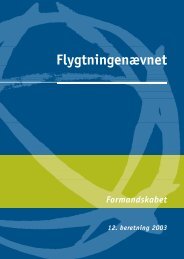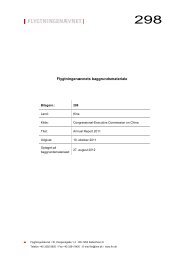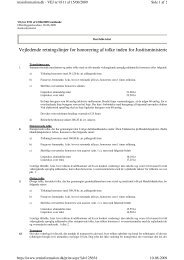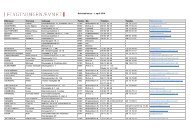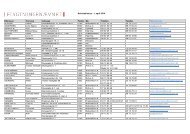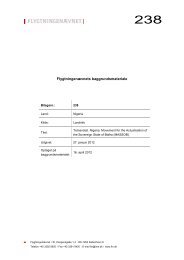Annual Report - National Human Rights Commission
Annual Report - National Human Rights Commission
Annual Report - National Human Rights Commission
You also want an ePaper? Increase the reach of your titles
YUMPU automatically turns print PDFs into web optimized ePapers that Google loves.
Annexure 12<br />
○ ○ ○ ○ ○ ○ ○ ○ ○ ○ ○ ○ ○ ○ ○ ○ ○ ○ ○ ○ ○ ○ ○ ○ ○ ○ ○ ○ ○ ○ ○ ○ ○ ○ ○ ○ ○ ○ ○ ○ ○ ○ ○ ○ ○ ○ ○ ○ ○ ○ ○ ○ ○ ○ ○ ○ ○ ○ ○ ○ ○ ○<br />
○<br />
by myths, for example, trafficking is usually presumed to be for the purpose of commercial<br />
sexual exploitation. Often, it is considered to be coterminous with prostitution. This research has<br />
demystified these concepts and issues, and has also shown that there is a requirement for all<br />
concerned to understand the appropriate meaning and import of various related issues. Similarly,<br />
the law enforcement agencies, including the immigration authorities, need to be properly trained<br />
to understand the linkages as well as the distinction between trafficking, migration and smuggling.<br />
All activities relating to prevention, protection and prosecution of trafficking have to necessarily<br />
originate from a clear understanding of all such concepts and their linkages. There is a need to<br />
develop guidebooks, brochures or flyers, which would help, demystify the concepts and bring<br />
about clarity to all stakeholders. In this context the UNIFEM briefing kit (2003) is a useful<br />
source book.<br />
Notifying the Advisory Body<br />
Despite the provision u/s 13(3)(b) ITPA for constituting an advisory body of NGOs, many<br />
states have not taken any initiative in this direction. Though the law does not deem it to be<br />
mandatory, considering the facts and circumstances clearly emerging from this study, partnership<br />
of civil society — represented by the advisory body of NGOs — with the law enforcement<br />
agencies, is not only an ideal mechanism, but also an essential requirement for addressing the<br />
issues relating to trafficking. Therefore, all state governments should consider constituting the<br />
advisory body consisting of NGOs as well as respected members of the public who are sensitive,<br />
committed and working against trafficking. The research experience shows that it would be<br />
better if the NGOs are notified on a District-basis or, at least, a regional basis, so that the services<br />
of the appropriate NGOs working in the field are co-opted.<br />
Forming Rules under ITPA<br />
State governments should revise the rules issued long back under SITA (Suppression of Immoral<br />
Traffic Act, 1956) and issue a fresh set of rules under ITPA. These rules should also list out the<br />
procedure and protocols, which are to be followed in rescue and post-rescue operations, keeping<br />
the best interest of the survivors/victims. These rules and provisions should clear the concepts,<br />
especially the existing confusion between trafficking and commercial sexual exploitation, and<br />
bring about clarity of understanding from a human rights point of view. The points that emerged<br />
from this study can be effectively utilized for preparing these guidelines and rules.<br />
Minimum Standards<br />
Governments should bring out state policies, including guidelines on the minimum standards of<br />
care, attention and service to be extended to the victims and survivors by all the service providers,<br />
including law enforcement officials, judicial officers, prosecutors, medical professionals,<br />
psychosocial professionals, counsellors, people manning after care homes, and all such<br />
stakeholders. The state policy should bring to focus the linkages between migration, HIV/AIDS<br />
and trafficking. The guidelines, which can be issued as information kits or handbooks, or as part<br />
of the rules to be issued under ITPA (as stated in the previous paragraph), have to be in<br />
270<br />
<strong>National</strong> <strong>Human</strong> <strong>Rights</strong> <strong>Commission</strong> <strong>Annual</strong> <strong>Report</strong> - 2004-2005<br />
AR-Chapter-1-19-10-6-06.p65<br />
290<br />
7/17/06, 6:31 PM



